Resource Center
The Transit Workforce Center is pleased to host a curated collection of publications and other materials to assist stakeholders engaged in transit workforce development. The Resource Center includes case studies, training materials, research reports, and other materials of interest, including publications produced by federal government agencies, transit organizations, and independent research entities. Resources may be filtered by topic, resource type, and transit mode. This TWC blog post explains how to use the Resource Center.
We are continuing to update the Resource Center regularly. Please contact us via the Request Help menu option if you would like assistance using the Resource Center or are looking for resources on a particular topic. We also welcome suggestions of topics or specific resources to add.
Content in external resources linked from the Resource Center is solely the responsibility of the resource authors and does not necessarily reflect the perspectives of or endorsement by the Transit Workforce Center.
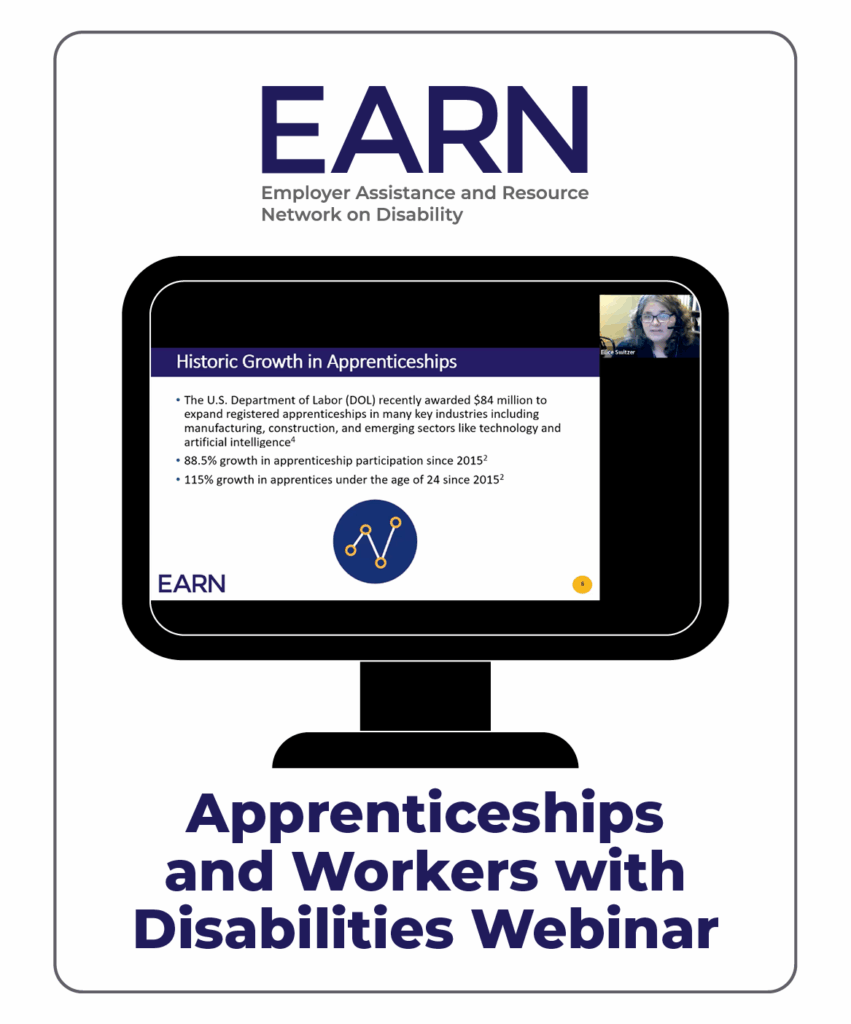
Apprenticeships and Workers with Disabilities Webinar
This webinar recording details practical strategies for recruiting and supporting apprentices with disabilities, as well as where to find recruitment resources and how to develop partnerships to build a talent pipeline.
Employer Assistance and Resource Network on Disability
August 2025
LEARN MORE
Paid apprenticeships combine education and on-the-job training to prepare workers for long-term career success. By ensuring that all qualified candidates, including those with disabilities, have an opportunity to access apprenticeship opportunities, employers benefit from a broader pool of qualified workers. This webinar recording details practical strategies for recruiting and supporting apprentices with disabilities, as well as where to find recruitment resources and how to develop partnerships to build a talent pipeline. It also highlights a case example of a manufacturing business that credits its partnership with a local community-based organization serving jobseekers with disabilities with saving the local business.
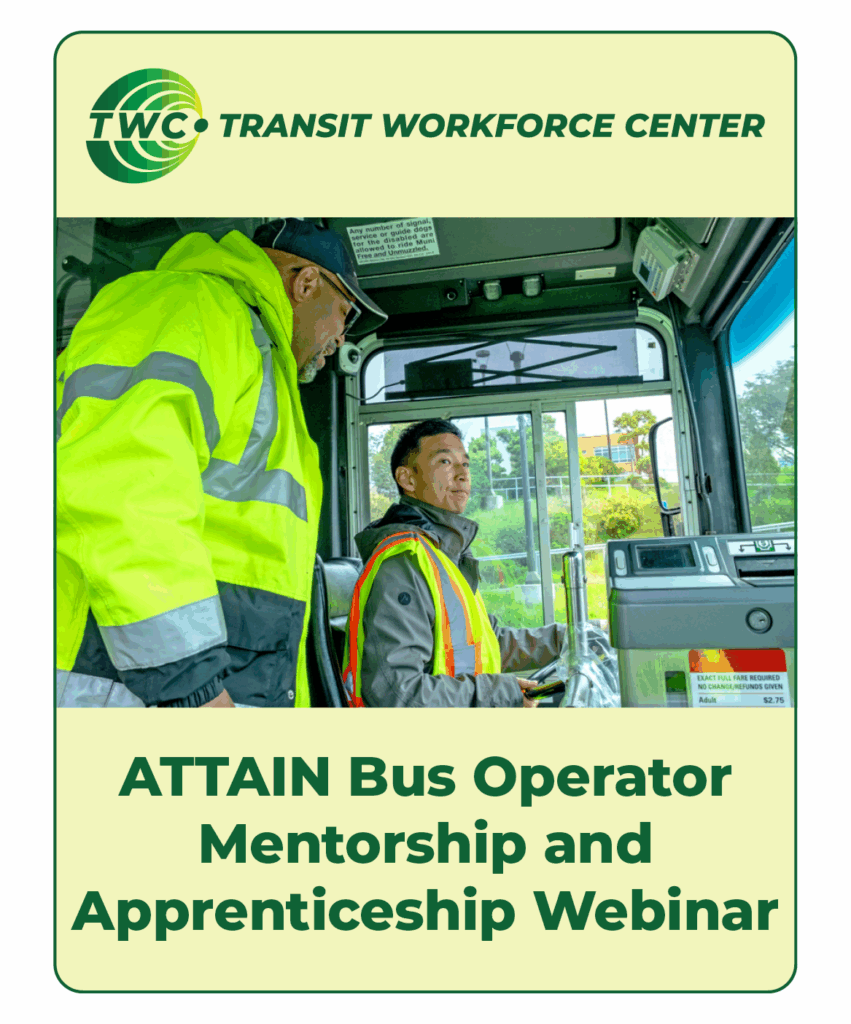
ATTAIN Bus Operator Mentorship and Apprenticeship Webinar
This webinar featured presenters from Greater Richmond Transit Company (GRTC)/ATU Local 1220 in Virginia and Champaign-Urbana Mass Transit District (MTD) in Illinois.
Transit Workforce Center
July 2025
TOPICS: Apprenticeship, Career Pathways, Community Engagement, Labor-Management Partnerships, Mentorship
This webinar featured presenters from Greater Richmond Transit Company (GRTC)/ATU Local 1220 in Virginia and Champaign-Urbana Mass Transit District (MTD) in Illinois.
- GRTC and ATU Local 1220 partnered to implement a mentorship program for their bus operators that launched in 2024. Presenters will describe that process, how the program has grown, and the benefits that it has provided.
- MTD launched its bus operator mentorship program in 2023 and has tracked metrics showing the program’s impact. Responding to both quantitative measures and qualitative feedback and observations, MTD is working to restructure the program to better meet the needs of the transit agency and the bus operators participating in the program as mentees or mentors.
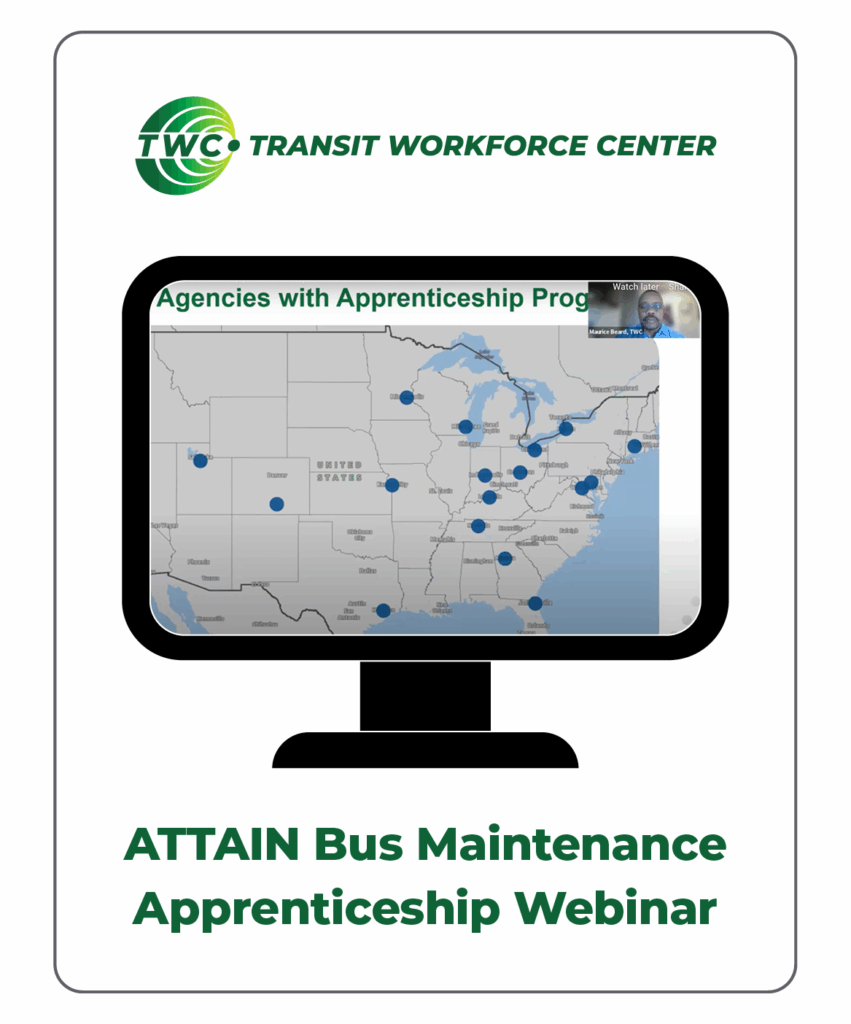
ATTAIN Bus Maintenance Apprenticeship Webinar
This ATTAIN webinar focused on bus maintenance apprenticeship programs and featured Milwaukee County Transit System/Amalgamated Transit Union Local 998 and Jacksonville Transit Authority/International Association of Machinists and Aerospace Workers Lodge 759. Panelists from these transit agencies and labor unions outlined the development process and the final structure of their apprenticeship programs while highlighting how this strategy was implemented and why it works, offering benefits for both the agency and the workforce.
Transit Workforce Center
May 2025
LEARN MORE
This ATTAIN webinar focused on bus maintenance apprenticeship programs and featured Milwaukee County Transit System/Amalgamated Transit Union Local 998 and Jacksonville Transit Authority/International Association of Machinists and Aerospace Workers Lodge 759. Panelists from these transit agencies and labor unions outlined the development process and the final structure of their apprenticeship programs while highlighting how this strategy was implemented and why it works, offering benefits for both the agency and the workforce.
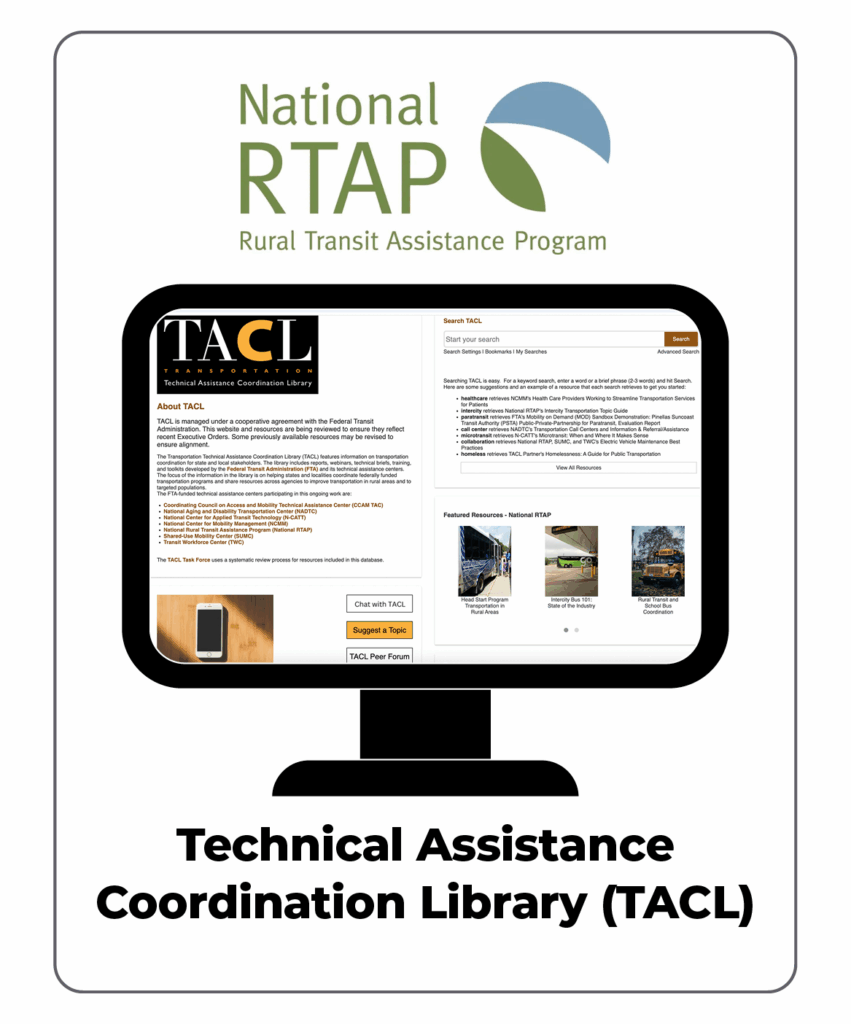
Technical Assistance Coordination Library (TACL)
The Transportation Technical Assistance Coordination Library (TACL) provides a viable methodology and platform for access and findability of rural and tribal transit coordination resources across a broad range of transportation technical assistance centers and the Federal Transit Administration (FTA).
National Rural Transit Assistance Program
TOPICS: Apprenticeship, Career Pathways, Community Engagement, Hiring and Recruitment, Labor-Management Partnerships, Low-No, Mentorship, Policy and Planning, Procurement, Program Evaluation and ROI, Retention, Safety and Health, Trainer and Mentor Development, Training, Workforce Shortage
Transportation Technical Assistance Coordination Library (TACL)
The Transportation Technical Assistance Coordination Library (TACL) provides a viable methodology and platform for access and findability of rural and tribal transit coordination resources across a broad range of transportation technical assistance centers and the Federal Transit Administration (FTA).
The FTA-funded Technical Assistance (TA) Centers participating in this ongoing work are:
- National Aging and Disability Transportation Center (NADTC)
- National Center for Applied Transit Technology (N-CATT)
- National Center for Mobility Management (NCMM)
- National Rural Transit Assistance Program (National RTAP)
- Shared Use Mobility Center (SUMC)
- Transit Workforce Center (TWC)
The TACL Task Force uses a systematic review process for resources included in the database. New resources will be added on a quarterly basis. Let us know if you would like to serve as a peer reviewer for our resources.
Why was TACL created?
The United States Government Accountability Office (GAO) published Public Transportation: Enhanced Federal Information Sharing on Coordination Could Improve Rural Transit Services in January 2020. GAO recommended that FTA “develop a communication plan that will effectively share information with state and local stakeholders on coordination opportunities in an accessible and informative way.” This effort was created to improve interagency resource coordination between FTA and its five TA Centers.
How can TACL be used?
TACL resources can be used to identify high quality technical assistance on transportation coordination. The resources can be used for research, training, practice, operations, planning, and other purposes. We encourage authors to cite TACL resources.
Ready to get started?
Visit http://transportation-tacl.org. Click on the Training tab at the top for instructions.
If you have a question about TACL, or if you would like to be considered to become a TACL peer reviewer, please contact info@nationalrtap.org
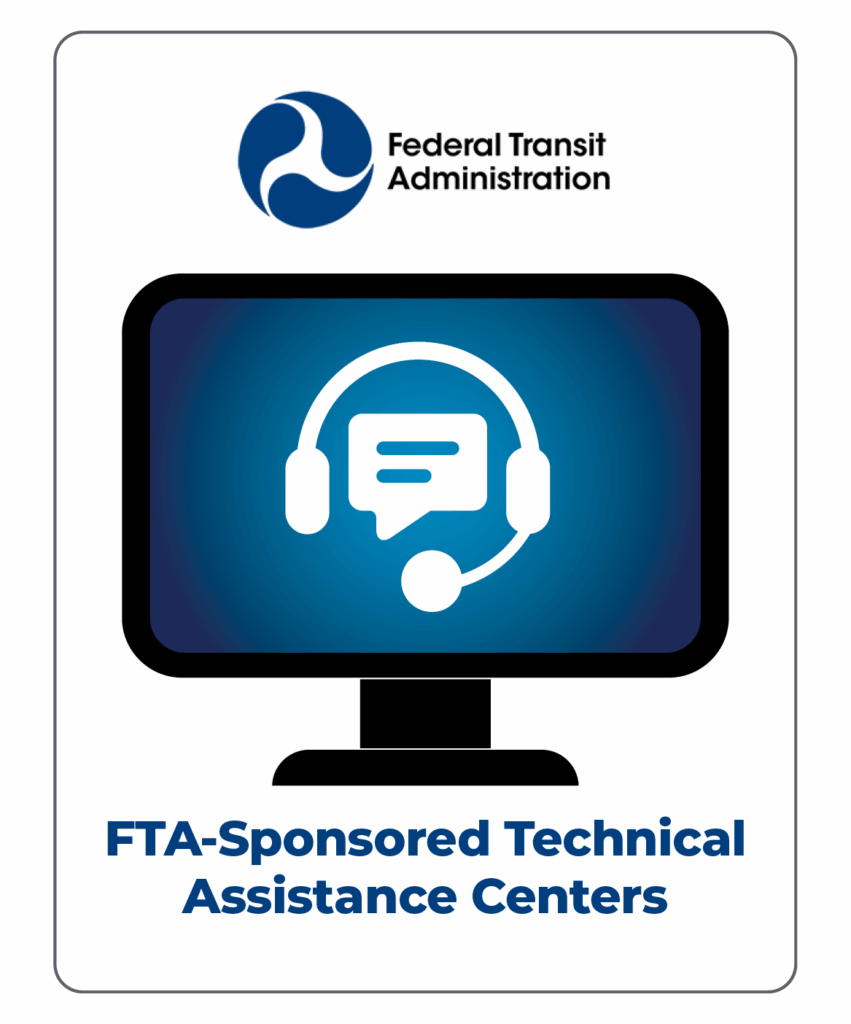
FTA-Sponsored Technical Assistance Centers
FTA’s Technical Assistance and Workforce Development Program (49 U.S.C. § 5314) and the Public Transportation Innovation Program (49 U.S.C. § 5312) fund technical assistance centers through national nonprofit organizations across a number of areas to improve public transportation. These nonprofit partners and the work they do play a critical role in supporting public transit agencies.
Federal Transit Administration
TOPICS: Apprenticeship, Career Pathways, Community Engagement, Hiring and Recruitment, Labor-Management Partnerships, Low-No, Mentorship, Policy and Planning, Procurement, Program Evaluation and ROI, Retention, Safety and Health, Trainer and Mentor Development, Training, Workforce Shortage
FTA’s Technical Assistance and Workforce Development Program (49 U.S.C. § 5314) and the Public Transportation Innovation Program (49 U.S.C. § 5312) fund technical assistance centers through national nonprofit organizations across a number of areas to improve public transportation. These nonprofit partners and the work they do play a critical role in supporting public transit agencies. Their services help to:
- Improve transportation for older adults and people with disabilities
- Drive the adoption of mobility management and related promising practices
- Accelerate innovative mobility practices and strategies
- Support rural communities
- Leverage new transit technologies
- Train the public transit workforce
- Provide workforce development technical assistance
- Support research projects chosen by the transit industry that address day to day issues
- Support the transit industry meet safety regulations
National Center for Applied Transit Technology (N-CATT)
The National Center for Applied Transit Technology (N-CATT) delivers expert, focused technical assistance to transit agencies and organizations in rural areas and small cities to use or develop transit technologies and innovations that make services more cost-effective and efficient. N-CATT’s work supports FTA’s mission and focus on innovation by developing and supporting transit programs and services in rural and small-city America.
National Aging and Disability Transportation Center (NADTC)
The National Aging and Disability Transportation Center (NADTC) is a national technical assistance center funded by FTA with guidance from the U.S. Department of Health and Human Services’ Administration for Community Living to promote the availability of transportation options that serve the needs of people with disabilities, seniors and caregivers with a focus on the Section 5310 program and other transit investments. NADTC supports the delivery of more effective, efficient, high-quality and coordinated specialized transportation services that maximize federal investments. NADTC provides technical assistance, information and referral; develops field training; implements interactive communication and outreach strategies; and supports communities in assessing their needs and developing innovative transportation solutions.
National Rural Transit Assistance Program (National RTAP)
The National Rural Transportation Assistance Program (RTAP) was established by FTA in 1987 to provide a wide range of professional services and products. National RTAP addresses the training and technical assistance needs of rural and tribal transit programs across the nation and supports state RTAP programs. National RTAP provides comprehensive free technical assistance programs and resources including training materials, webinars, newsletters and technical briefs, peer resources, research, and innovative technology initiatives. The National RTAP also manages the Transportation Technical Assistance Coordination Library (TACL), which provides a sustainable methodology and platform to access resources across a diverse range of transportation technical assistance centers and FTA.
Shared-Use Mobility Center (SUMC)
The Shared-Use Mobility Center is a public-interest organization dedicated to achieving equitable, affordable, and environmentally sound mobility across the US through the efficient sharing of transportation assets. By connecting the public and private sectors, piloting programs, conducting new research, and providing policy and technical expertise to cities and regions, SUMC seeks to extend the benefits of shared mobility for all. The Shared Mobility 2030 Action agenda includes improving access to public transit, on-demand shuttles or buses, ride-on-demand services, carpooling and vanpooling, and carsharing, bikesharing and scooter-sharing.
Coordinating Council on Access and Mobility (CCAM)
The strategic goal of CCAM, operated but the Community Transportation Association of America, is to support federal agencies, their grantees, partners, and stakeholders in improving transportation access for people with disabilities, older adults, and individuals of low income. CCAM promotes and facilitates human services transportation, public transit, and non-emergency medical transportation (NEMT) coordination that advances people’s access to everyday destinations.
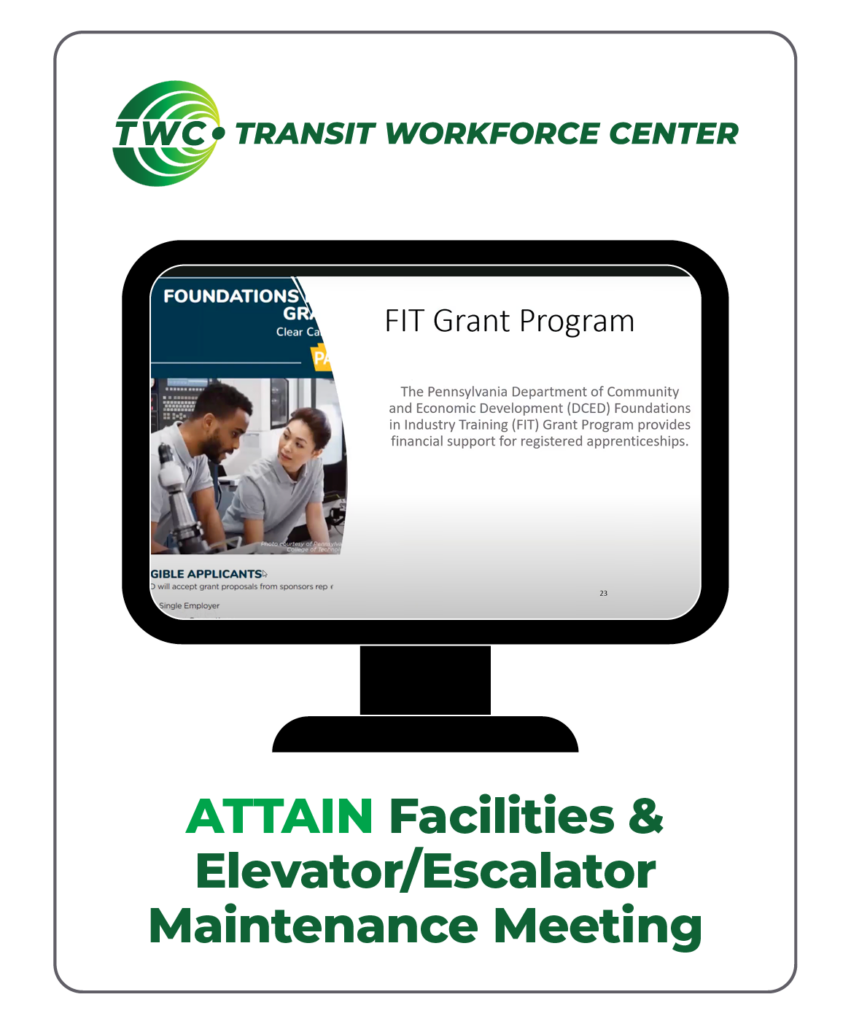
ATTAIN Facilities & Elevator/Escalator Maintenance Meeting
This ATTAIN meeting featured discussions from Pittsburgh Regional Transit/ATU 85 and Bay Area Rapid Transit about how their facilities and elevator/escalator maintenance apprenticeship programs are developed, work, and the benefits they offer.
Transit Workforce Center
September 2024
LEARN MORE
The American Transit Training and Apprenticeship Innovators Network (ATTAIN) is a peer network created for transit agencies and labor unions to explore new apprenticeship programs or enhance existing programs for their frontline workforce. Through ATTAIN, TWC promotes apprenticeship, advances frontline worker training, facilitates peer exchange, and provides technical assistance to agencies and unions interested in developing apprenticeship programs for their frontline workforce.
This ATTAIN meeting featured discussions from Pittsburgh Regional Transit/ATU 85 and Bay Area Rapid Transit about how their facilities and elevator/escalator maintenance apprenticeship programs are developed, work, and the benefits they offer.
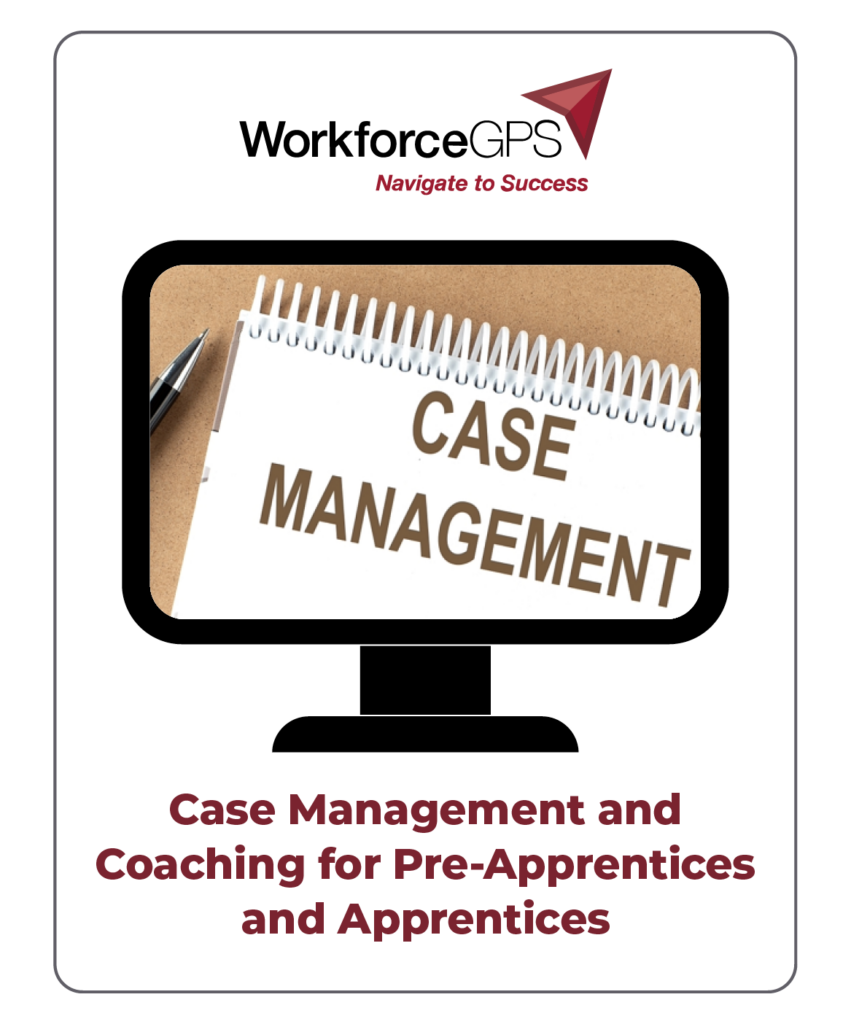
Case Management and Coaching for Pre-Apprentices and Apprentices
Working with pre-apprentices and apprentices requires a combination of case management and coaching. This webinar provides the fundamentals of case management and coaching and teaches a framework for effective service delivery. This session also focuses on the use of assessments for productive service planning, quality program documentation and team communication for successful handoffs.
Workforce GPS
August 2024
LEARN MORE
Working with pre-apprentices and apprentices requires a combination of case management and coaching. This webinar provides the fundamentals of case management and coaching and teaches a framework for effective service delivery. This session also focuses on the use of assessments for productive service planning, quality program documentation and team communication for successful handoffs.
MODERATOR(S)
- Luis Roig, Contracting Officer’s Representative, Office of Apprenticeship, U.S. Department of Labor Employment and Training Administration
PRESENTER(S)
- Amy Landesman, Grantee Coach, ICF
- Valerie Taylor, Grantee Coach, ICF
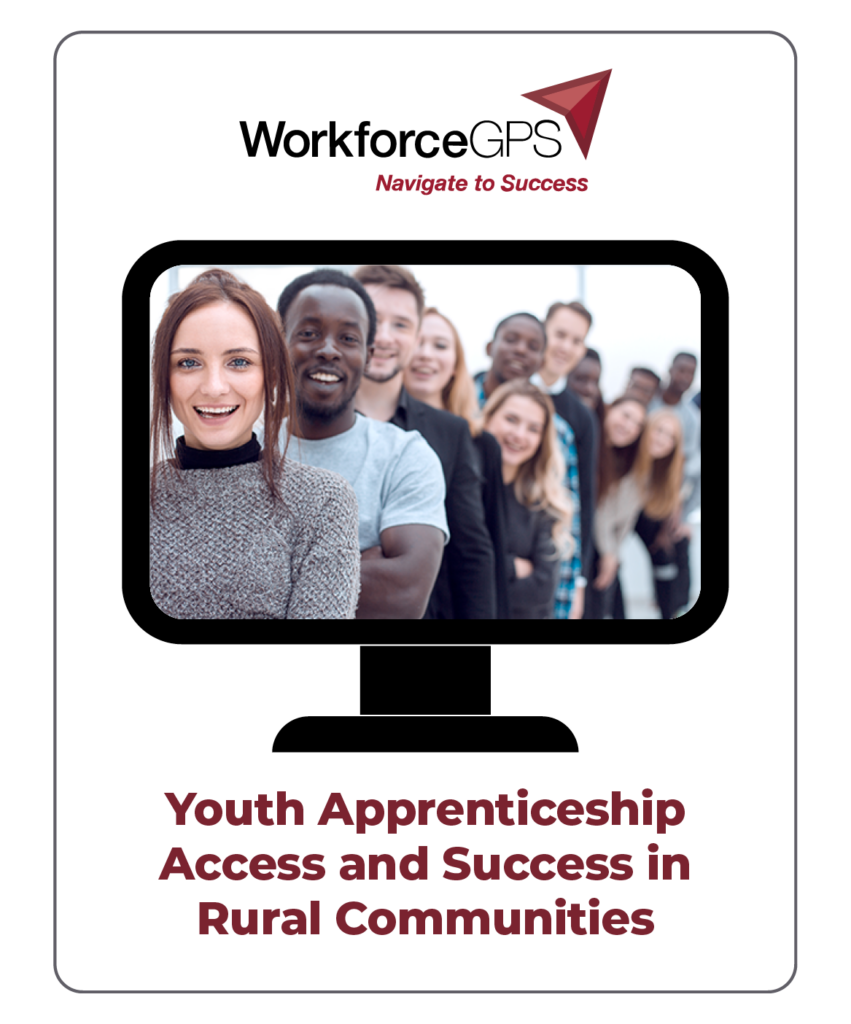
Youth Apprenticeship Access and Success in Rural Communities
In rural communities, widely dispersed populations face a multitude of access challenges. Faced with a declining talent pool, lower educational attainment, and rising poverty rates caused by the Covid-19 pandemic, there is an urgent need to prepare young people in rural areas for high-demand careers.
WorkforceGPS
August 2024
TOPICS: Apprenticeship, Career Pathways, Community Engagement, Mentorship, Retention, Trainer and Mentor Development
In rural communities, widely dispersed populations face a multitude of access challenges. Faced with a declining talent pool, lower educational attainment, and rising poverty rates caused by the Covid-19 pandemic, there is an urgent need to prepare young people in rural areas for high-demand careers.
As part of the Implementing Workforce Programs for Rural Youth series, this webinar, hosted by the Office of Apprenticeship, focused on best practices and creative solutions for increasing pre-apprenticeship and youth apprenticeship access, enrollment, retention, and program completion for young people in rural areas. Featured youth apprenticeship intermediaries and partners shared their accomplishments in developing youth apprenticeship opportunities in rural areas, establishing networks of support, and best utilizing available resources to ensure pre-and youth apprenticeship success.
MODERATOR(S)
- Maisha Meminger, Manpower Analyst , Division of Youth Services, U.S. Department of Labor, Employment and Training Administration
PRESENTER(S)
- Vanessa Bennett, Associate Director, Center for Apprenticeship & Work-Based Learning, Jobs for the Future
- Zach Boren Senior Policy Program Manager, Urban Institute
- Bhavani Arabandi, Senior Research Associate, Urban Institute
- Jacqueline Rayfield, Policy Analyst, Urban Institute






 CLEAR
CLEAR

